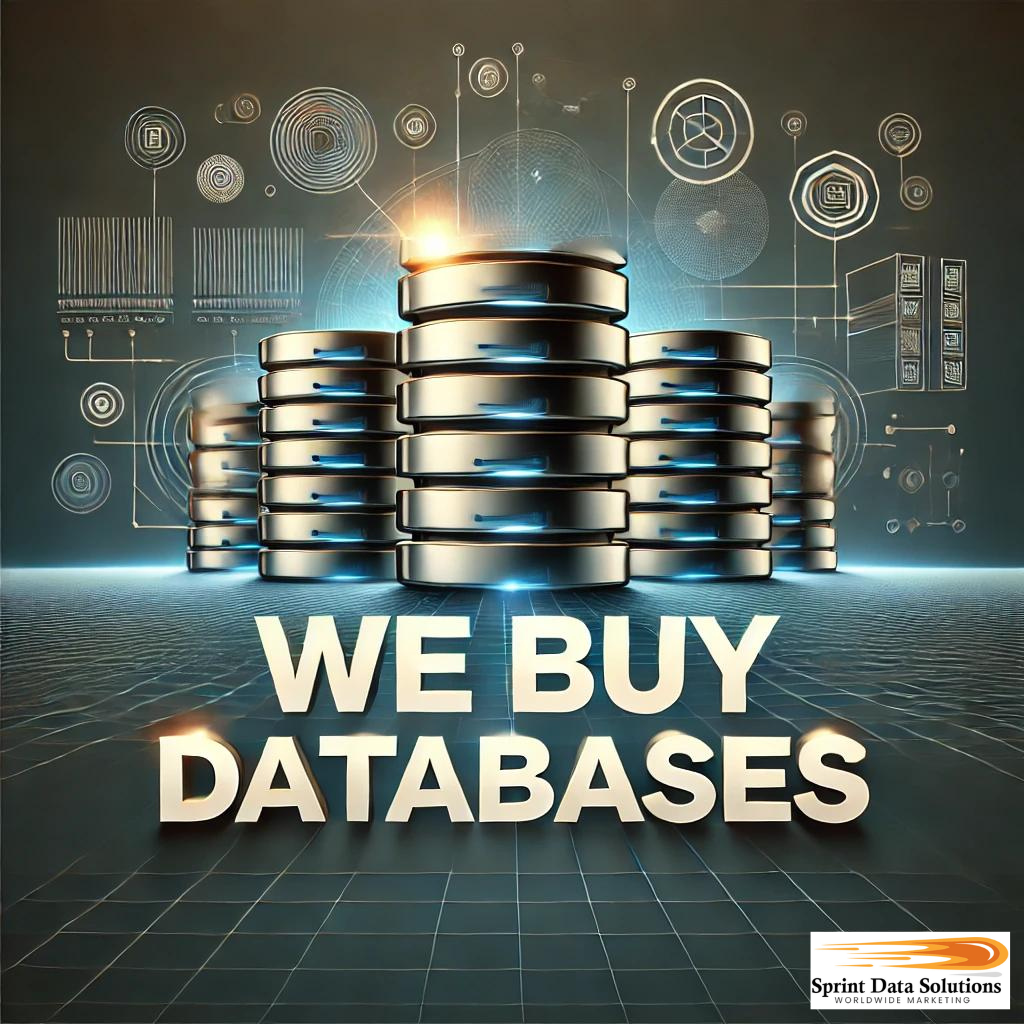If You Have Databases, We Want Them
The 21st century is often referred to as the “information age,” a term that highlights the transformative shift from an industrial and mechanical focus to one centered around digital advancements. Unlike the previous century, which saw groundbreaking developments in machinery and manufacturing, the modern era is defined by the rise of digital technologies, particularly computers and the internet. This digital revolution has fundamentally altered how information is created, stored, accessed, and used. In the past, physical limitations such as the size of a roll of film or the number of books a person could store constrained personal and business life. Today, these limitations are virtually eliminated, thanks to the digitalization of information. Photos, documents, and media can be stored in boundless quantities and accessed instantly, thanks to the storage capacity of digital formats like hard drives, cloud servers, and USB sticks.
Perhaps one of the most profound changes brought about by this digital age is the ability to store vast amounts of archival data in ways that were once unimaginable. Information that would have required enormous physical storage—such as filing cabinets filled with documents or entire rooms dedicated to paper records—can now fit onto a small digital storage device. The creation of cloud storage and the proliferation of online databases have made it possible for data to be kept not only more efficiently but also more securely, with redundancies built into the systems that ensure the preservation of data even if one storage site fails. This shift has radically changed the way businesses, governments, and individuals manage and interact with information.
However, while digital data storage and management have made accessing information easier, it has also led to a challenge: the sheer volume of data makes it difficult to determine what is valuable. The relevance and utility of data are not always obvious, and what is useful in one context may be completely irrelevant in another. For industries like marketing, the ability to pinpoint the right data—tailored to specific demographics, geographic regions, or consumer behaviors—is crucial. This challenge has given rise to sophisticated data analytics and management strategies designed to sort, filter, and interpret large datasets to uncover valuable insights.
For businesses seeking to target specific markets, particularly those looking to reach accredited investors through various marketing channels such as direct mail, email, telemarketing, or SMS, the need for precise data is paramount. Whether you’re looking to refine your outreach based on geographic location, demographic traits, or other market segmentation factors, having access to the right data is essential to reaching your desired audience and achieving your business goals. If you’re ready to take advantage of these powerful data-driven tools, contact us today to access a wealth of marketing solutions that can transform your outreach strategy.

It’s More Than Just Names
In today’s highly interconnected digital landscape, marketing and promotions have evolved to reach potential customers across a variety of channels, including physical mail, email, telephones, social media, and more. At the core of effective marketing lies a fundamental resource: reliable contact data. Without accurate, up-to-date contact information, marketing efforts simply cannot reach the intended audience. However, the real challenge comes with the variety of contact methods available for each individual. People can be reached through a wide range of channels, yet determining the most effective and preferred method for each person requires careful consideration. Connecting the right contact point with the right individual requires a comprehensive approach, as not all contact details will be available or suitable for every person.
In addition to basic contact information, there is a critical layer of value within marketing data: the demographic, behavioral, and psychographic characteristics tied to each contact. These values offer deeper insight into a potential customer’s preferences, interests, and life circumstances. A mere contact point doesn’t offer the full picture of an individual; instead, it’s essential to understand who the person is, what they care about, and what drives their purchasing behavior. Historically, gathering this level of insight was difficult, if not impossible. However, with the rise of digital platforms and the vast amount of data people generate through online activities, this information is now accessible. Big data analytics, machine learning algorithms, and predictive modeling have revolutionized the way businesses can understand and segment customers, enabling them to create highly personalized marketing strategies that speak to individual needs and desires.
Sprint Data Solutions Worldwide Marketing is at the forefront of this evolution, focusing on collecting, organizing, and analyzing vast databases to help businesses improve their marketing outreach. The company is dedicated to expanding its inventory of contact data by actively seeking new databases to enhance its offerings. Whether you’re looking to offload a database you no longer need or share valuable contacts with a trusted partner, Sprint Data Solutions is equipped to handle these requests. The company’s focus on data accuracy, relevance, and granularity allows clients to target their campaigns more effectively, ensuring that marketing messages are not only delivered but resonate with the right audience.
Who Is Sprint Data Solutions Worldwide Marketing?
Sprint Data Solutions Worldwide Marketing is a proudly American-owned and operated business, founded by a disabled veteran with a mission to serve the U.S. business community. After completing military service, the founder channeled his dedication to growth and success into building a company that focuses on helping businesses expand their customer base. The company was established in Las Vegas, Nevada, and, from its humble beginnings, it has grown significantly, driven by a deep commitment to quality and customer satisfaction. Today, Sprint Data Solutions Worldwide Marketing boasts a team with over 50 years of combined experience in the marketing and promotions industry, ensuring expertise in every facet of its services.
The company’s offerings have evolved to meet the needs of a rapidly changing marketing landscape, integrating traditional services like direct mail with cutting-edge digital marketing strategies. Sprint Data Solutions Worldwide Marketing specializes in providing highly targeted marketing data, offering direct mail services, email marketing, and telemarketing solutions, all supported by accurate and up-to-date customer databases. From its roots in Las Vegas, the company has expanded its services to a national scale, covering all 50 states, including Alaska and Hawaii, and now offers comprehensive marketing solutions throughout North America, including Canada and Mexico. For businesses with international aspirations, Sprint Data Solutions Worldwide Marketing also provides access to global markets, offering detailed databases for countries like France and other nations across Europe.
As a leader in the data-driven marketing industry, Sprint Data Solutions Worldwide Marketing emphasizes the value of accurate, timely, and comprehensive data. By continuously updating and refining their databases, the company ensures businesses can reach their ideal customers with precision. With a focus on innovation, customer-centric services, and market expansion, Sprint Data Solutions Worldwide Marketing continues to support clients’ marketing success both in the U.S. and around the world.
Always Expanding
Sprint Data Solutions Worldwide Marketing understands that the growth and continual enrichment of its database archives are vital for staying ahead in an evolving marketplace. The company actively seeks opportunities to source data from a diverse array of reliable providers to enhance the value and relevance of its datasets. This includes leveraging a variety of channels such as public records, industry-specific data, survey responses, opt-in forms, and third-party partnerships to ensure that every database is comprehensive, current, and tailored to meet the dynamic needs of its clients. By pursuing multiple data streams, Sprint Data Solutions Worldwide Marketing ensures that its databases provide not only accuracy but also deep insights that enable businesses to target their audience with precision, making each marketing campaign more effective and impactful following:
Consumer Databases
The general retail market is incredibly vast and dynamic, with customers constantly searching for specific products or services that meet their individual needs and preferences. This creates an opportunity for businesses to target niche markets, from avid gaming enthusiasts who willingly share their personal information when signing up for a new game or service, to automotive aficionados who provide detailed data, including their name, address, and phone number, while purchasing specialty car parts or accessories.
Consumer databases, while diverse and extensive, are never truly exhaustive. The variety of customer types is so immense that it’s impossible to capture every single consumer in a single database. Each database reflects only a portion of the market, but the information contained within it can be highly valuable. Companies can segment these databases into different groups based on factors like interests, purchasing behaviors, and demographics, allowing for tailored marketing strategies that maximize engagement.
Moreover, there will always be untapped customer segments hidden within specific demographics, offering new opportunities for businesses to expand their reach. For instance, niche hobbies, seasonal product preferences, or emerging trends create continuous demand for more specialized data. As a result, businesses must regularly update and refine their databases to ensure they stay ahead of shifting consumer interests and remain effective in their marketing campaigns. The ongoing evolution of consumer behavior means that the potential for reaching new customers is ever-present, and data-driven marketing can help businesses uncover these hidden opportunities to boost sales and customer loyalty.
Complete Business Databases
The B2B sector represents one of the most lucrative and dynamic markets, with businesses continuously seeking solutions that enhance their efficiency, profitability, and competitiveness. These transactions often involve larger investments, as companies are willing to spend on products or services that can streamline operations, increase productivity, or improve their market standing. When a business finds the right match for its needs, the potential for a long-term, reliable income stream is substantial. However, achieving this requires a deep understanding of the business’s specific needs, as well as offering solutions that meet or exceed their operational requirements.
One of the greatest challenges in B2B marketing lies in accessing the right individuals within an organization who are authorized to make purchasing decisions. While reaching out to a business via its website or general contact number may appear straightforward, these methods do not guarantee that the decision-maker in charge of the relevant department will be contacted. Effective B2B marketing requires databases that go beyond general business contact information, instead focusing on precise details such as the names, roles, and titles of key decision-makers within the company. A well-maintained and detailed database includes these specifics, ensuring that outreach efforts are directed to the right person, who has the authority and relevance to evaluate and act on the proposal. This targeted approach significantly increases the chances of securing a profitable transaction and establishing a long-term business relationship.
International Databases
Expanding a business to the global market can present both exciting opportunities and significant challenges. One of the primary obstacles is navigating the complex landscape of different languages, cultures, and even alphabets, which can make communication with international customers or partners more difficult. For businesses seeking to reach new individual customers or engage in B2B ventures abroad, there are several key factors to consider to ensure success.
First and foremost, understanding the local market is crucial. Businesses must adapt their offerings to align with the specific preferences, needs, and behaviors of consumers in foreign countries. This requires detailed demographic insights, such as age, gender, income level, purchasing habits, and geographic location, which can vary significantly from domestic markets. Additionally, cultural nuances and local regulations must be accounted for to avoid missteps in marketing strategies, product development, or customer engagement.
Another critical aspect is identifying the right contact points for outreach. This means obtaining accurate and up-to-date contact information for potential customers or business partners, whether through email, phone numbers, or other communication channels. For international B2B relationships, having access to decision-makers’ contact information is paramount, as well as insights into the structure and needs of target industries.
In the process of preparing to enter the global market, businesses must also invest in reliable data collection systems. These systems should facilitate segmentation based on key data points, enabling companies to pinpoint the right audiences and develop highly targeted marketing strategies. Whether focusing on consumers or other businesses, a comprehensive understanding of local markets, coupled with access to accurate contact data and demographic breakdowns, can give American businesses a significant competitive edge when approaching international customers or exploring global B2B opportunities.

Database Services Available Too
Sprint Data Solutions Worldwide Marketing goes beyond simply acquiring databases; we specialize in evaluating and optimizing data to unlock its full potential. Using the same advanced techniques we apply to enhance our clients’ data, we provide insights that help individuals and businesses understand the true value of their data. Our expertise in data analysis and management ensures that incoming data is not only organized but also leveraged to its maximum effectiveness, empowering clients to make informed decisions and achieve their marketing goals with precision. Whether you’re looking to optimize an existing database or better understand newly acquired information, we offer the tools and knowledge to get the most from your data. Among our included services are:
Database Appraisal Service
Data holds its value only when it’s understood and properly utilized. Not all data is created equal, as some datasets offer greater relevance, accuracy, and potential for targeted marketing than others. This is where our expert database appraisal service comes in. We thoroughly evaluate incoming databases to assess their true worth, considering factors such as freshness, completeness, accuracy, and market potential. By analyzing industry-specific trends and aligning them with current market rates, we provide a comprehensive appraisal, helping individuals and businesses understand the true value of their data. Whether deciding to sell or optimize its use, our service offers the insights necessary to maximize the potential of their databases in a rapidly changing market.
Database Consignment Services
Another valuable service that enhances convenience for all parties is our database consignment program. If you have a database that you wish to sell but prefer not to manage the sale process yourself, Sprint Data Solutions Worldwide Marketing can handle the entire transaction on your behalf. We take full responsibility for marketing and selling your database while ensuring that it is meticulously maintained throughout the process. With our expertise, we can actively promote the database to potential buyers, ensuring you get the best possible value. When clients express interest, you benefit from the sale, all without the need for direct involvement or management. This program provides a seamless, low-effort way to monetize your database while we handle the operational aspects. Your database is in safe hands, as we treat it with the utmost care and diligence to maintain its relevance and value throughout the consignment period.
Ready To Negotiate
Sprint Data Solutions Worldwide Marketing is committed to continuously expanding and enhancing its service capabilities through the active acquisition, evaluation, and curation of databases. Unlike many of our competitors, we don’t simply lease access to third-party data sources—we invest in and manage our own proprietary databases, ensuring the highest level of quality and strategic alignment. Our approach is to selectively engage with vendors to make data purchases that align with our specific business goals and data analytics services.
If you have a database you are looking to sell or a dataset that no longer serves your business objectives, Sprint Data Solutions Worldwide Marketing may be a suitable buyer. We are particularly interested in acquiring databases that meet our stringent internal standards for accuracy, relevance, and usability. We understand that data can change over time, and as such, we prioritize databases that have current, actionable information. This ensures that our clients receive data that can drive successful marketing campaigns and business decisions.
Our commitment to data quality extends to all our services. For example, when providing high-value political donor lists, we take extreme care to validate that the data is not only recent but also genuine and relevant to our clients’ needs. We do not deal with outdated or irrelevant information; we only share data that aligns with our clients’ business goals and marketing objectives. In addition, we are open to acquiring large databases—those containing 100,000 contacts or more—making us a valuable partner for businesses with significant data assets.
Sprint Data Solutions Worldwide Marketing’s commitment to strategic data acquisition and rigorous quality control sets us apart as a leader in providing reliable, tailored data solutions. Our clients trust us to deliver actionable insights, and we are constantly refining our practices to ensure that our data offerings are among the most reliable and precise in the industry.

Let’s Work Together
If you have a database that you’re no longer interested in maintaining, or if you have leads you are considering selling, we may be the ideal partner to help you maximize its potential. At Sprint Data Solutions Worldwide Marketing, we adhere to a strict set of protocols when acquiring databases to ensure the highest standards of accuracy and quality. We take into account key factors such as database size, relevancy, and legitimacy—ensuring that only the most current and valid data is passed along to our clients.
We understand the value of maintaining databases that are both relevant and authentic. As such, we are always open to considering databases available for sale, thoroughly analyzing them to verify their authenticity and suitability for our expansive client network. Whether you are looking to offload outdated records or monetize a high-quality, well-maintained list, we are here to offer fair, market-driven evaluations and provide an opportunity to optimize your database’s investment potential.
Our commitment to data accuracy means that details such as mailing addresses, email addresses, phone numbers, and other demographic characteristics must be verified and up-to-date. By partnering with us, you not only get access to our expertise in data management but also enhance the value of your database, ensuring that it remains an asset for future marketing efforts. If you are ready to sell your database, or simply want to explore how we can help you unlock its full potential, don’t hesitate to reach out. We look forward to working with you to generate mutual value for both your business and our clients.






